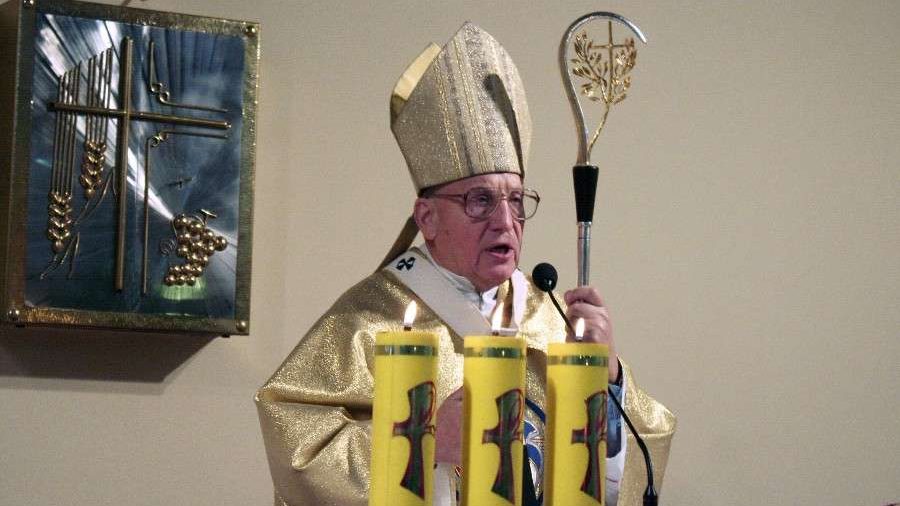A Catholic archbishop appealed for prayers Tuesday, a day after he was blocked from entering Belarus by border guards.
In a Sept. 1 message to Belarusian Catholics, Archbishop Tadeusz Kondrusiewicz said that he was turned back while attempting to cross the border between Poland and Belarus Aug. 31.
The archbishop of Minsk-Mogilev said that although the border guards “behaved very correctly,” their decision to refuse him entry to his homeland was “absolutely incomprehensible” and contravened the law.
“The ban on entering the Republic of Belarus prevents me, as the Ordinary of the Archdiocese of Minsk-Mogilev and the Chairman of the Conference of Catholic Bishops in Belarus, from carrying out pastoral ministry and participation in planned Church events,” he said, according to the message published at Catholic.by, the website of the Catholic Church in Belarus.
Kondrusiewicz was born to an ethnic Polish family in Odelsk, Belarus, and is a citizen of the Republic of Belarus.
Referring to the unrest in the country following a disputed presidential election Aug. 9, the 74-year-old archbishop said that he continued to appeal for dialogue and reconciliation.
“I do not want an unreasonable and illegal decision of the border service to increase tensions in our country,” he said in the letter, written from the Polish city of Białystok, near the border with Belarus.
Belarus, a country of 9.6 million people bordering Russia, Ukraine, Poland, Lithuania, and Latvia, has seen widespread protests since the incumbent Alexander Lukashenko was declared the winner of the presidential election with 80% of the vote.
Electoral officials said that the opposition candidate, Sviatlana Tsikhanouskaya, earned 10% of the vote. She was detained for several hours after complaining to the electoral committee, and has fled to Lithuania.
Police arrested thousands of demonstrators who took to the streets demanding a recount. Despite a severe crackdown, protests have continued across the country.
Kondrusiewicz demanded an investigation last week into reports that riot police blocked the doors of a Catholic church in Minsk while clearing away protesters from a nearby square.
He prayed outside of a prison Aug. 19 where detained protesters were reported to have been tortured.
Kondrusiewicz met with Interior Minister Yuri Karaev Aug. 21 to express his concerns about the government’s heavy-handed response to the protests.
In a pastoral letter read out in churches Aug. 30, the archbishop said he feared the country might be heading for civil war.
Catholics are the second-largest religious community in Belarus after Orthodox Christians. The U.S. government estimates that 53% of Belarusians are Orthodox, 6% Catholic and 8% atheist.
Lukashenko has served as president of Belarus since the office was established in 1994, three years after the country declared independence from the Soviet Union.
According to the state-owned Belarusian Telegraph Agency (BelTA), Lukashenko addressed the incident involving Kondrusiewicz Sept. 1, saying that he did not possess full information about the event. He suggested that the archbishop might be a citizen of more than one country.
“We are looking into the matter. I do not claim it. We want to study the issue. If everything is according to the law, we will act accordingly. It does not matter whether he is the main Catholic, the main Orthodox, or the main Muslim. He has to live by the law. If you mix church and politics and call for believers, Catholics, who are wonderful people, there is double responsibility for that,” BelTA quoted him as saying.
In a Sept. 1 interview with Catholic.by, Bishop Yuri Kasabutsky, an auxilary bishop of Minsk-Mogilev archdiocese, said that Kondrusiewicz’s citizenship status was clear.
“Archbishop Tadeusz Kondrusiewicz has only one citizenship -- Belarusian, and according to the law, his right to enter cannot be restricted in any way,” he said.
In his message to his flock in Belarus, Kondrusiewicz said that he had appealed to the State Border Committee to allow him to return to the country. He added that he hoped it was simply a “misunderstanding” that would be swiftly corrected.
“To you, dear brothers in the episcopal and priestly ministry, consecrated persons, believers and people of good will, I appeal for prayer for my speedy return to my homeland and a peaceful solution to the acute socio-political crisis in our Motherland,” he said.

